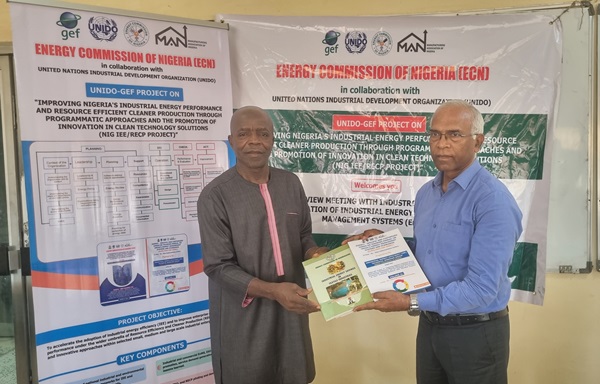
The Industrial Energy Efficiency (IEE) Consultant with the United Nations Industrial Development Organisation (UNIDO), Engr. Okon Ekpenyong has emphasised the importance of improving Nigeria’s industrial energy use through a collaborative project between the Energy Commission of Nigeria (ECN) and UNIDO.
The initiative, supported by the Global Environment Facility (GEF), is titled “Improving Nigeria’s Industrial Energy Performance and Resource-Efficient Cleaner Production through Programmatic Approaches and the Promotion of Innovation in Clean Technology Solutions.”
Speaking during a kick-off review meeting with Chellco Industries Limited in Kaduna, Ekpenyong said the project aims to promote sustainable industrial energy practices across the country. He explained that the overarching goal is to create systems that allow industries to optimise their energy use while minimizing environmental impact.
“The project focuses on implementing ISO 50001 energy management systems,” he stated. “This standard encourages companies to adopt best practices in energy efficiency, reduce waste and lower production costs.”
Ekpenyong emphasised that energy is a major cost component in industrial production. Reducing energy wastage translates directly into savings for companies and more competitively priced products in the market. “When production costs fall, companies become more competitive. That’s why the benefits of this project are far-reaching.”
He noted that part of the initiative includes supporting industries to better measure and manage their energy consumption. “You cannot manage what you do not measure,” he said, adding that accurate data is key to tracking progress, identifying inefficiencies, and improving performance.
He encouraged industries to start by recording and analysing their energy usage over time, comparing electricity and diesel costs against production output. This simple act, he said, could help companies identify trends and correct inefficiencies before they escalate into financial burdens or environmental damage.
“Efficiency is about output relative to input,” he said. “We must ask: how much energy are we using, and does it match our output? Are we consuming more energy than necessary?”
The project also considers environmental impact. “When energy is wasted, it’s not just a cost issue, it’s a pollution issue,” Ekpenyong noted. “The electricity we waste often comes from fossil fuels like oil and gas, which release harmful emissions into the environment. So, improving energy efficiency also means reducing our carbon footprint.”
He stressed the importance of raising awareness about industrial energy efficiency across Nigeria. “Sensitisation is essential,” he said. “Industries need to understand the financial and environmental benefits of efficiency. They need training, data tools, and support systems to thrive.”
General manager of Chellco Industries, Mohan Yadav welcomed the initiative and highlighted the importance of using energy-efficient equipment in manufacturing. “There’s a wide variety of parts in the market,” he said, “and the differences in energy consumption can be significant. Some companies use up to 600 litres of fuel a day. That’s not sustainable.”
He explained that one of the company’s greatest challenges has been identifying quality equipment that minimises energy use while maintaining productivity. “If we can get this right, we’ll not only cut costs but also reduce emissions and improve our production processes.”
Yadav pledged Chellco’s commitment to the project and said the company would work with UNIDO and ECN to implement the recommended practices. “We appreciate the guidelines introduced and plan to adopt them fully,” he said. “Energy efficiency isn’t just a target – it’s a necessity for our survival and growth.”
The project includes a component with the Bank of Industry (BoI) to provide financial support to industries implementing energy-efficient technologies. Ekpenyong said this financial backing would further encourage participation and ease the burden of transitioning to cleaner technologies.
As Nigeria works toward reducing greenhouse gas emissions and modernising its industrial base, this GEF-supported initiative could be pivotal. It promises not only cost savings for industries but also progress toward national climate goals.
By combining international standards, capacity building, and financial incentives, the ECN–UNIDO project is setting the stage for a more resilient, efficient and environmentally responsible industrial sector in Nigeria. Stakeholders are encouraged to actively participate and make energy efficiency a central part of their operations.

